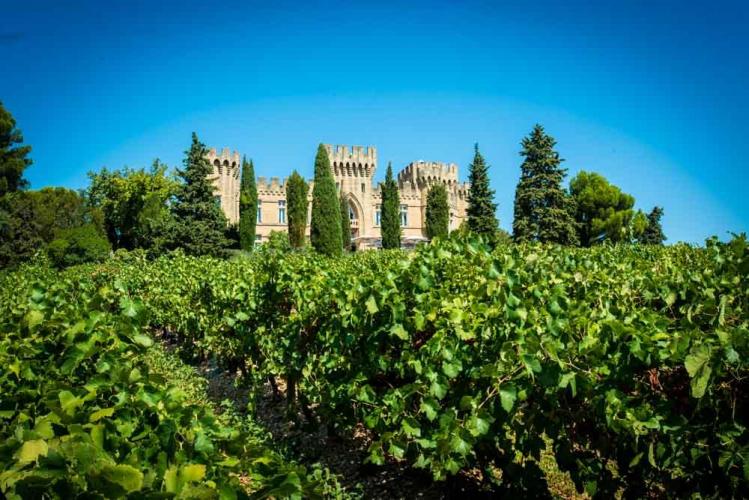Talk about Chateauneuf du Pape with Tuscany Tour and Provence and Wine

Last week, we had a chance to talk with one of our favorite Provence wine guides, Romain Gouvernet, about what distinguishes Southern Rhone wines from other wines on the market. Romain is a certified sommelier and the owner of Provence and Wine. He offers exceptional wine tasting experiences at some of the most famous wineries of Chateauneuf-du-Pape and the Provence region.
Pam: Romain, how did you find your passion for the wine industry or did it find you?
Romain: I was born in Avignon, famous for its Popes Palace, and have spent most of my life in the Avignon and Chateauneuf-du- Pape area. When I was a student, I used to help with the wine harvest in the famous vineyards of Chateauneuf-du-Pape where I fell in love with the beauty of this remarkable world famous wine growing area, and also the wine.
I spent 2 years studying in Ireland, perfecting my English, and then returned to France where I worked in finance in Paris for 4 years. I eventually realized my true passion lay in the wine industry sector.
After graduating from the 'Wine and Spirit Education Trust ' (WSET) in Paris, I returned to Avignon where I started working as a manager at a famous winery responsible for oenotourism. These experiences led to the founding of my own company: Provence and Wine.
Pam: What can you tell our readers about Provence and Southern Rhone wines?
Romain: The Southern Rhone wines are in the Provence region and have a Mediterranean climate with milder winters and hot summers. The vineyard is very beautiful and the terrain is rich and diversified to provide full-bodied and complex wines. The Southern Rhone's most famous red wine appellation is Chateauneuf-du-Pape. This region is very famous for its stony soil, and a Chateauneuf-du-Pape wine may contain up to 19 varieties of wine grapes (ten red and nine white) as permitted by the Chateauneuf-du- Pape AOC rules.
Gigondas AOC, on the other hand, is predominantly made from Grenache noir has a more restricted set of permitted grapes. Depending on the specific AOC rules, grapes blended into southern Rhone reds may include Grenache, Syrah, Mourvedre, Carignanand Cinsault. The wines are slightly lighter and fruitier partly due to the elevation of the terrain.
Pam: What factors weigh into the composition of the Provence wines? Do the mineral components in the soils show up in the wines?
Romain: Chateauneuf-du-Pape, for instance, is very well-known for its complex and diverse soil which has its origin in a million years old glacier (which became later the Rhone river). We have clay, limestone, sand, sandstones, river stones. Chateauneuf-du-Pape is well-known for its river stones which are very unique and specific to this area. They are very good for drainage, they absorb the heat during the day and give it back to the vines during the night which helps to bring the grapes to the right level of ripeness.
The climate is a Mediterranean climate and Chateauneuf-du-Pape has 2800 hours of sun per year. The atmosphere is dry, especially during the summer. The wind "Mistral" is a great advantage for the vineyard as the wind participates to keep the area sunny and dry. It is a natural ventilation which also keeps humidity and diseases away.
Pam: How do Southern Rhone wines different from the other famous French varieties? And, why are Chateauneuf-du-Pape wines so successful?
Romain: We grow 13 grapes types which all have different characteristics and provide different profiles to the wine. There is no regulation in terms of the blend so the winemakers can blend in any proportion. This gives a lot of options to the producers to create very different types of Chateauneuf-du-Pape wine. The main grapes are Grenache, Syrah, and Mourvedre for the reds and White Grenache, Roussane and Clairette for the whites. Grenache, which is the king of CDP, is only grown in the south of France where the climate is Mediterranean (for France).
Besides the AOC, Chateauneuf-du-Pape is very strict and regulated: Harvest by hands, low yield (max 35hl/hectare), and no irrigation.
The success of Chateauneuf-du-Pape wine is due to the combination of naturals factors (great amount of sun, dry climate, wind, complex soil...) and all of the strict regulations which are based on old "know-how" and history.
Tuscany Tours
Pam: Considering the amount of sun the grapes get, why is it that Chateauneuf-du-Pape wines are not just jam/syrup? And, what accounts for their complexity?
Romain: This is due to several factors. Chateauneuf-du-Pape wines are not jam/syrup because:
• The high level of alcohol is well-balanced with the others components of the wines (acidity and tannins). • The acidity and the freshness which is given by the variation of temperatures between nights and days. • The Mistral wind which moderates the hot climate, and
• The minerals participate to balance the high level of alcohol and keep the wine well-balanced.
The complexity of the Chateauneuf-du-Pape wine is also due to several factors :
• The soil (terrain) is complex and provides a different profile of wines.
• The fact that we can use until 13 different grapes types (all with different characteristics) and blend it in any proportion provide a lot of options and complexity to the wine.
• Finally, we have more than 300 producers in Chateauneuf-du-Pape with a different history, background, philosophy, and methodology in terms of viticulture, winemaking, aging, and blending.



